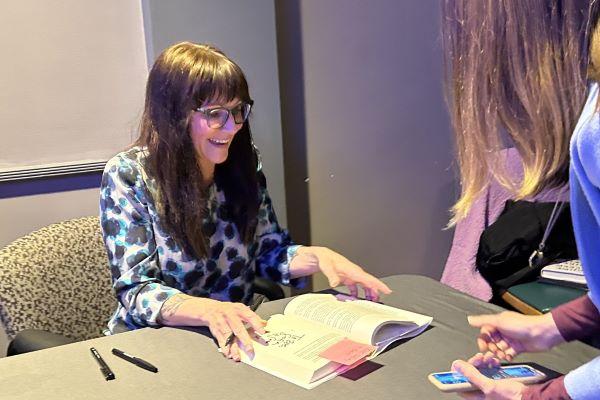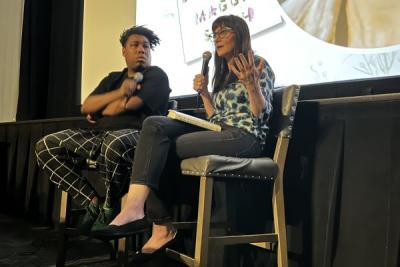Alumna Maggie Smith has made this book beautiful


It’s as if poet and memoirist Maggie Smith (MFA ’03, Department of English) knows what we need when we need it. And she shares it. From her own journey. From her own worry. From her heart.
Her book You Could Make This Place Beautiful, released this month and now a New York Times bestseller, is a collection of nearly 300 vignettes that give us a window into Smith’s life as she navigated the end of her marriage, became a single mom and evolved to new ways of thinking and being in the world.
If the title sounds familiar, you may remember it as the last line of Smith’s best-known poem “Good Bones,” published in June 2016, the same week a gunman opened fire in a gay nightclub in Orlando, killing 49 people and wounding 53. In just 17 lines, Smith expressed concern for her young daughter and son as well as her own quandary as a mother in a way that resonated with parents everywhere. Her clear, authentic voice squarely hit home, leading the poem to go viral then and several times afterward when Americans were confronted with senseless violence.
One Signal/Atria, a division of Simon & Schuster, published her book Keep Moving: Notes on Loss, Creativity, and Change in October 2020. Somehow, a sliver of the hope we all needed to weather an unparalleled pandemic could be derived from the compilation of affirmations she penned to herself and posted to Twitter as her family changed shape with her divorce. Her messages resonated, leading to Keep Moving and a companion 52-exercise journal to help readers cope with their own challenges.
In You Could Make This Place Beautiful, Smith walks us through her “tell-mine,” which she defines in the second paragraph of her prologue: “This isn’t a tell-all because ‘all’ is something we can’t access. We don’t get ‘all.’ ‘Some,’ yes. ‘Most,’ if we’re lucky.’ ‘All,’ no. There’s no such thing as a tell-all, only a tell-some — a tell-most maybe. This is a tell-mine, and the mine keeps changing, because I keep changing.”

The book’s brief essays are insightful and engaging, relatable precisely because they are so everyday, so real. Her vulnerability brings us aboard. She’s going through hard stuff — we all do sometimes — and she writes what she’s feeling. And maybe what we would be feeling if we were in her shoes.
Yet despite her openness, she sets boundaries, telling us what she won’t tell us, often when it has to do with her children or her relationship with the man she expected to grow old with.
Many of the vignettes do focus on her parenting, though, and her efforts to keep her children’s lives stable despite changing family dynamics. Some of the stories share how Smith, born and raised in the Columbus area, worked to hold onto the Bexley house she and the kids still call home. They gather for Sunday dinners with Smith’s parents and siblings in Westerville, where she grew up within an easy drive from the university she chose for her graduate degree.
Thirteen years after earning her master of fine arts in poetry, Smith returned to Ohio State’s Department of English in 2016 as a visiting professor and has continued to remain connected through guest lectures and other engagements.
Here’s what a few Ohio State colleagues and others are saying about Smith’s work in general and about You Could Make This Place Beautiful in particular:
“Maggie Smith, no matter the genre or structure of her work, has the remarkable ability to immediately call a reader or listener close, and to make a circuitry of energy between her books and their audience that allows for a lively, ongoing connection. Whether calling out the baffling forces of the relentless world and its strange systems, or singing about the gleaming endurance of the soul, Maggie Smith’s voice creates new space for reprieve and belief.” — Marcus Jackson, associate professor of English and director of Ohio State’s MFA Program in Creative Writing
“In the wake of a painful divorce, Maggie Smith, in prose both lyrical and uplifting, examines her marriage, herself and more importantly her burgeoning sense of herself as an author able to touch thousands of lives and hearts.” — Kathy Fagan Grandinetti, professor of English and 2023 Guggenheim Fellowship recipient
“I’ve nearly finished reading @maggiesmithpoet’s new memoir and I’m so grateful to have spent this time with her. We are decades apart and on the same page. How does she do that?” — Connie Schultz, Pulitzer Prize-winning columnist and author of The New York Times bestselling-novel The Daughters of Erietown
“You Could Make This Place Beautiful is a sparklingly brilliant memoir-in-vignettes that only Maggie Smith could write. Yet this is a book for everyone — who among us has never had our world upended by the loss of a relationship? Maggie Smith’s powerful mastery of language, and amazing ability to portray life in all its rich messiness, is on full display in this bold, brutally candid, and yes, beautiful, book.” — Isaac Fitzgerald, New York Times bestselling author of Dirtbag, Massachusetts
“Listen, you may not need me to tell you what you already know about the shining star that is Maggie Smith, but you can certainly add me to the chorus of those singing her praises about You Could Make This Place Beautiful. Among her singular gifts as a writer are the way she swiftly brings her poetry to her prose; her willingness to show up to the page with aspirational levels of vulnerability, grace, and joy; and a clarity of heart amid the heartbreak that together make this a moving and gorgeous must read.” — Elizabeth Crane, author of This Story Will Change
